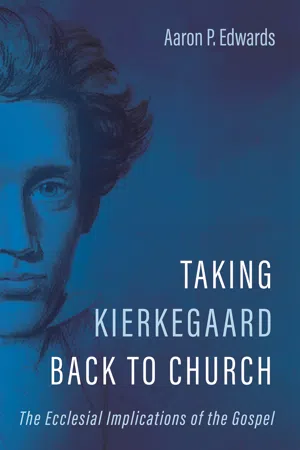![]()
1
On Kierkegaard’s Evangelical “Reputation”
A Kerygmatic Introduction
Christian churchgoers could be forgiven for wondering what on earth a thinker such as Søren Kierkegaard could ever have to do with them. The first time I ever heard the name “Kierkegaard” was, somewhat appropriately, in the context of absurdism. I was sitting in an undergraduate English literature seminar, listening to my tutor—a brilliant and polemical atheist—who was talking about this exotic-sounding Scandinavian as one of the great forebears of absurdist and existentialist thought. I might have taken no further notice but that I remember him casually adding that this exotic Scandinavian was “a profound Christian, albeit a very depressed one.” The tutor then went on to talk about all these other famous atheists of the modern era—Sartre, Camus, Derrida, Foucault et al.—whose systems of thought were apparently unimaginable without the influence of the Melancholy Dane. I was somewhat intrigued that this enigmatic Christian thinker was somehow the intellectual grandfather for all their philosophical mischief which seemed so irreconcilable with the Christian faith. Naturally, I assumed that if Kierkegaard even was a Christian, he was likely a fairly uncommitted one. “Perhaps,” I thought, “Kierkegaard was just one of those people who had grown up in a Christian culture, who appreciated the social stability of Christian rituals and services but who himself had experienced very little of what it meant to truly follow Christ in and against this world on a personal level.” For those who know a little more about Kierkegaard than I did at the time, a wry smile can be the only suitable response to such an absurd conception of Kierkegaard’s Christian faith given the fact that almost the precise opposite was the case.
Such an ironically mistaken judgment of Kierkegaard’s Christian convictions, whether from Christians or atheists, is surprisingly common. Kierkegaard has always been a tricky thinker to deal with, refusing to sit neatly into any box into which he appears to have leapt, before sliding out the other side into another before you’ve realized where he is. James Collins, in the preface to the thirtieth-anniversary edition of his 1953 book, The Mind of Kierkegaard, referred to Kierkegaard’s authorship as “this literary and religious Hobbitland” in which it was fascinating to delve, but not the most fashionable place to stay. As Jacques Collette noted, in the postmodernist heyday of the 1960s, “Kierkegaard is neither Saint nor great theologian,” but a somewhat “obstructive teacher.” Truly, it would seem, if Kierkegaard was ever going to be received as a substantial theological blessing to the Church, he could only be so with a fair amount of heavily qualified caveats. This opening chapter will introduce the primary themes of the book by discussing some of Kierkegaard’s various reputational misdemeanors, working backward (as Kierkegaard sometimes liked to do) through the relativistic, postmodern, and post-evangelical interpretations, to the missionary and kerygmatic heart of Kierkegaard’s thought which accentuates precisely how important Kierkegaard’s voice remains for the Church.
Kierkegaard as Relativist, Postmodern, or Evangelical?
Because of the mystical elusiveness of Kierkegaard’s authorship, particularly his use of multiple pseudonyms, it has often been easier for the anti-theist to claim him for their own deconstructive or existentialist purposes, and for the Evangelical Christian to claim Kierkegaard’s liabilities for precisely the same reasons.
The “Relativist” Kierkegaard?
The most notable negative reading of this kind was Francis Schaeffer, who was possibly the most influential Evangelical voice of his generation, and who had at one time questioned whether or not Kierkegaard was even a “real” Christian at all. Although Schaeffer later revised his view and came to see the value of Kierkegaard’s devotional writings, he nonetheless saw Kierkegaard’s thought as an essential separation between faith and reason. According to Schaeffer, the existentialist “turn” catalyzed by Kierkegaard’s thought led directly to the many erosions to objective truth against which Schaeffer was himself contending in the mid- to late twentieth century.
In Schaeffer’s own mission to respond to the great challenges facing the cause of the Gospel within his generation, he not only saw Kierkegaard’s project as an unhelpful hindrance but as the actual cause of the whole mess. Schaeffer’s interpretative schemas of thought were sometimes depicted through intriguing (if somewhat bizarre) arrowed diagrams depicting the trickle-down impact of particular thinkers upon the fissures within modern culture and society. Within one such diagram Kierkegaard sits, unmistakably and unforgettably, near the very “top” of the tree, complete with a set of dotted steps cascading down to the Sheol-lands of modern despair. There is no question that, for Schaeffer, Kierkegaard had inadvertently opened up a great pandora’s box that terminated in what he called “the escape from reason,” with all manner of terrible implications for the propagation and reception of Christianity in the modern world.
As much as Schaeffer later admitted that Kierkegaard would not have approved of this legacy, it was a deed that could not be undone. When making such an evaluation, however, it is difficult to know precisely how much of Kierkegaard’s works Schaeffer had actually read firsthand, and how much was gleaned from secondary interpretations. For example, one of Schaeffer’s key philosophical mentors, Cornelius Van Til, wrote a letter to Schaeff...
